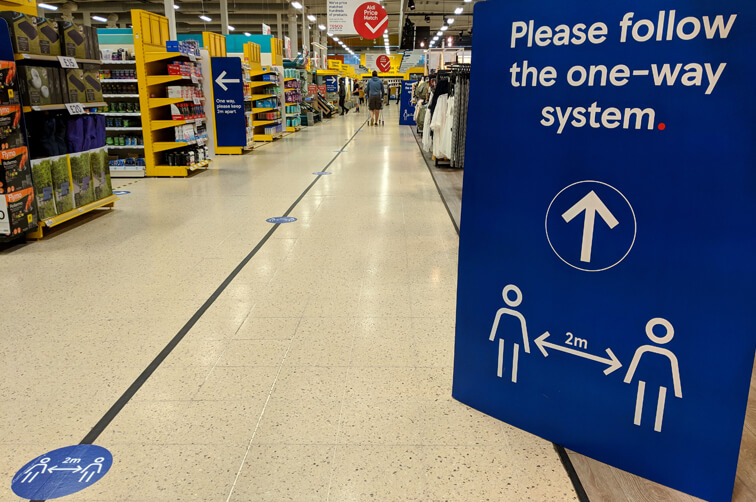
Our CEO and Founder, David Grimes, shares some lockdown lessons as he reflects on what the pandemic has taught suppliers and retailers about the industry.
Throughout the pandemic, change has happened at such a rapid pace that a lot of retailers have been forced into transforming the way they work overnight. Across the industry, retail teams have tried to find a balance between implementing quick fixes to solve immediate problems and future-proofing the business for the longer term. This is especially tricky where CX is concerned, as customer journeys are severely broken by delivery experience; or where IT infrastructure needs to rapidly flex to support warehouse and fulfilment fluctuations.
All this change presents us with an opportunity though – retail has always been one of the most resilient sectors, so it’s our duty to use the pandemic to deepen our understanding of how we operate during a crisis. The lessons we’re learning now, sometimes the hard way, are things we all need to take forward – they’ll arm us for the next set of challenges that will undoubtedly come along.
We’re extremely lucky at Sorted, and we get to work really closely with a long list of retail clients from a variety of subindustries and retail models. During the pandemic, we’ve also opened up loads of new conversations with other retailers looking for support too. As we act as an extension of the in-house team, we’ve been able to make quite a few observations on reoccurring themes emerging from the pandemic response.
I’m encouraging you to take a step back and zoom out – make a note of the things that have made you, your team and your business hardier to the challenge of sudden, business-critical change.
My list is long but, as we get ready to enter the second half of the year, I thought I’d briefly share five of the many ‘lockdown lessons’ I’ve learned so far – on both a personal and a professional level.
ALL RETAILERS ARE IN THE SAME BOAT.
Nobody has it completely under control. Obviously, no-one was fully prepared for a global pandemic – it wasn’t really high up anyone’s risk register – but, in theory, systems should be agile and flexible enough to cope with rapid and continuous change. Everyone is prepared to different levels, but there isn’t one business we’ve spoken to (out of dozens and dozens) that could hand on heart say their business was configured to respond to operational disruption like this. A big wake-up call, pre-Brexit.
That means there’s a lot of work to be done by retailers to reconfigure their systems and processes in a way that will remove the ‘single point of failure’ dependencies, and ensure business continuity programmes are in place for times of uncertainty.
SUPPLIERS HOLD THE REINS WHEN IT COMES TO RETAIL OPS CHANGE.
Let me explain.
Retailers aren’t expected to be market-leading experts in every single area.
They need to work with third-parties that specialise in specific, niche areas and provide support to the in-house teams that are spinning plates and fighting fires. That means that, in most cases, retail leaders (rightfully) look to their suppliers for tech expertise and consultancy – and this has never been truer than during the pandemic.
As suppliers, we’re in the unique position to guide the way; making sure we’re obsessively keeping a helicopter view of market trends and advising clients on the most effective way to implement change.
Your supplier, particularly for delivery management, should be a proactive enabler. Not a blocker.
THERE’S ONE MAJOR STUMBLING BLOCK FOR MOST RETAILERS’ POST-PURCHASE CX.
I usually pay close attention to delivery tracking comms anyway (I like to make sure REACT is best-placed in the market), but as I’ve done more online shopping during lockdown I’ve been monitoring comms performance across the purchases I’ve made. Naturally, deliveries have been disrupted, but only a small number of brands actually told me about it – the rest left me waiting, frustrated, to find out for myself.
No prizes for guessing which retailers I’ll be shopping with again in future.
Whilst the final mile has, overall, responded well to increased pressure, there has been a glaringly obvious gap when it comes to customer service, post-purchase comms and tracking transparency.
STORE ESTATE, EVEN WHEN CLOSED, HAS NEVER BEEN MORE IMPORTANT.
Time and time again, we’re seeing frustrated retailers with stock trapped on the shop floor. Shutters are down on hundreds of store locations that could, quite easily, begin to operate as mini distribution centres to help with fulfilment at a local level. Warehouses are under immense pressure as online shopping volume suddenly runs at peak – but, simultaneously, retail units on high streets and retail parks are packed to the brim with seasonal stock that could be pushed out through ecom channels.
Probably the biggest lesson we’ve all learned during the pandemic – store utilisation is something that needs to be reviewed across the market.
HOW TO MAKE BANANA BREAD.
Oh come on, did you really think you’d made it through a ‘lockdown lessons’ list without mention of it? My baking skills have been in demand (mainly from my family, but still), and I’ve found it to be quite a mindful hobby. Maybe it’s something about being methodical, following the recipe and taking the task step by step to get to the showstopping end result. I’m happy to share the secret to transforming delivery experience, but I’m not sharing my secret banana bread recipe. Sorry.
If you’re collating your own list of lockdown lessons – whether they’re related to retail, home working or mental health – I’d love to hear them. Tweet Sorted your thoughts and share your learnings; partnership and collaboration are key to thriving during times like this.